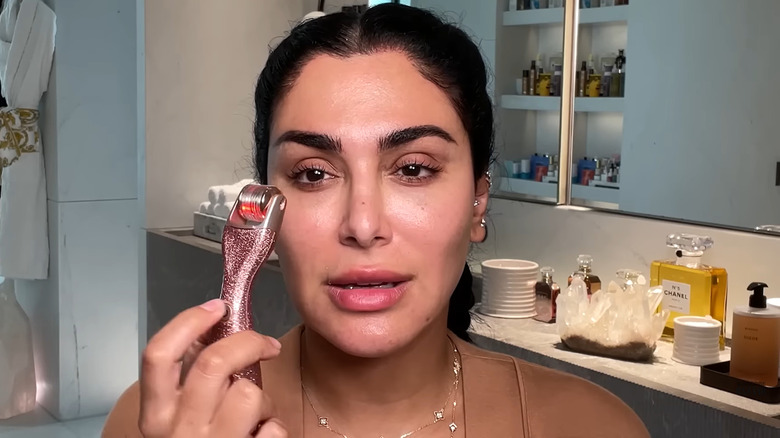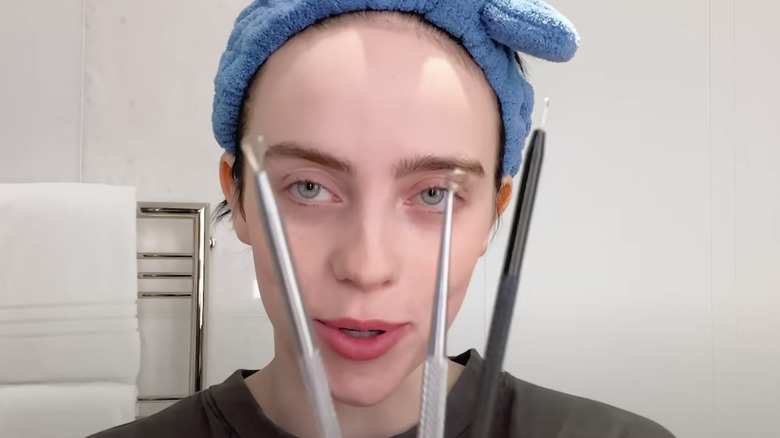The Biggest Skin Care Mistakes That Even Celebrities Make
These days, skin care advice is everywhere. We're bombarded with Instagram posts and TikTok videos proclaiming the next miraculous routine or product. In addition to influencers, celebrities often provide skin care advice on social media and promote products they claim work wonders — and the rest of us are left wondering what really works, what we should try, or whether we should just opt to try everything at once. Needless to say, skin care can be confusing and even intimidating at times.
We likely don't have to tell you that celeb skin care advice should be taken with a grain of salt. The truth is that they make just as many skin care mistakes as we do, and many of the quick fixes we see on social media simply don't work. "We are learning that instant gratification [with skin treatments] isn't always useful in the long run," celebrity esthetician Aida Bicaj told explained on the MindBodyGreen podcast, "Clean Beauty School." She added, "Skin care is not fashion" — meaning we shouldn't treat the products we use on our faces as passing trends. You need to find what works for you and stick to it, regardless of what your favorite celeb or influencer is saying. "I mean, how do you know what works for you if you are using 10 different products from 10 different companies?" Bicaj mused. The key to glowing skin is patience and perseverance.
Here are some of the biggest skin care mistakes even your favorite celebs are guilty of making, and what you should be doing instead.
Sleeping with makeup on
Raise your hand if you've ever slept in your makeup (most of us have, right?) You probably know by now that sleeping with makeup on is one of the biggest skin care no-nos, and for good reason. "Not removing your makeup for the night clogs your pore and oil glands," dermatologist Dennis Gross told Bustle. "When makeup becomes impacted in pores, it makes them appear larger. Once your collagen levels decline, the pore won't snap back as easily once it has been enlarged," he warned, adding that making a habit of falling asleep with makeup on can also cause the skin to become inflamed. This is the opposite of the glowing complexion we all long for, so it's best to always cleanse before bed.
If you're anything like Dolly Parton, though, it might take some effort to break this bad habit. During an interview with The New York Times, the singer revealed that she only ever washes her face in the morning. She prefers to keep her makeup on during the night in case of any emergencies that will require her to show her face in public. Kim Kardashian has admitted to doing the same thing, but for a different reason — the star told "Busy Tonight" (via People) that it saves her time in the evening, adding that she sometimes wears the same face of makeup for two (!!) days. Well, this "hack" won't save your face from future wrinkles or pimples, that's for sure.
Not cleansing in the morning ... or at all
If you're not reaching for a cleanser twice a day, you're doing it wrong, experts say. Speaking to InStyle, Melanie Palm, a cosmetic dermatologist and surgeon, explained that our faces aren't as squeaky clean as they may appear in the morning. "Dead skin cells and allergens may collect on your pillowcase and be transferred to the facial skin throughout the night," Palm explained, adding that you might even have some invisible mold and dust particles on your skin in the morning if you sleep in a room with air conditioning.
If you typically skip cleansing your face in the morning, you're not alone. Celebrities like Kate Hudson and Cameron Diaz have admitted to forgoing their morning cleansing routines. "I wake up and, honestly, I don't do any cleanser. I do water on my face in the morning with a cloth," Hudson told Allure, saying that she started to break out less once she did so. However, celebrity esthetician Aida Bicaj told MindBodyGreen that breakouts are often the result of using cleansers that are way too harsh for your skin type (another common mistake).
Diaz, on the other hand, takes it to the extreme. "I literally do nothing. I like never wash my face," she told W Magazine, adding that she uses some skin care products every once in a while (gasp). Palm told InStyle that it's crucial to cleanse your face to ensure your skin care products work effectively — "dirty" skin simply can't absorb it as well.
Picking skin or zits
Oh, we're definitely all guilty of this one, right? Popping and picking at zits can be so darn satisfying; however, experts say it's about one of the worst things you can do to your skin.
Celebrity esthetician Renée Rouleau explained on her site that picking at your skin from a young age (or any age, really) can start to manifest as spotty, pigmented, and uneven skin as you age. We ordinary folks might think we're the only ones who make this big skin care mistake, but it turns out that some celebrities also struggle with keeping their hands off their faces when zits pop up.
Speaking to The Cut, Scarlett Johansson admitted that she used to pick at her face constantly, adding that she was once pretty compulsive when it came to fiddling with blemishes on her skin. Does she regret it? Absolutely. "I wish I didn't pick my skin so much when I was younger, I could've avoided so much scarring and drama," she told the outlet. She's not wrong — nor is she the only celeb with the habit. Busy Phillipps took to Twitter in 2018 and revealed that she, too, has a habit of picking her skin.
Speaking to Allure, board-certified dermatologist Erin Gilbert cautioned that permanent scarring is a very real risk, especially if you pick at cystic acne. "These scars are difficult to treat once they've occurred," she said, adding that you can save yourself a lot of trouble and money by keeping your fingers off your face.
Opting for a DIY skin care routine with questionable ingredients
We all love trying some fun DIY things we see on TikTok every now and then, but skin care remedies shouldn't be one of them. On her site, celebrity esthetician Renée Rouleau revealed that one of her clients suffered burns on her face after applying baking soda mixed with lemon on her skin. "Lemon juice is extremely acidic with a pH of around 2. This not only caused severe damage to this client's moisture barrier but was actually giving her burns." Rouleau writes.
Some celebrities are especially guilty of using DIY skin care. In a video Bella Thorne made for Harper's Bazaar, she shared her nighttime skin care routine, revealing that she uses all-natural skin care products that she makes herself. This includes a lemon, sugar, and olive oil scrub and a face mask she makes out of cherries, coconut oil, and honey. Good enough to eat? Maybe. Good for your skin? Not exactly.
As Rouleau noted, using lemon juice on your skin is a huge no-no. Applying other fruits like strawberries directly to your face may hold some benefits, but according to WebMD, none of these benefits have been definitively proven. You could wind up dealing with some unexpected side effects, as some people are allergic to certain fruits, and applying them to your skin could have disastrous results.
Overusing exfoliators
If you've ever had to deal with red or irritated skin after getting too scrub-happy with a new exfoliator, you're not alone — and we'll forgive you if you think exfoliating every day is a good thing. After all, supermodel Christie Brinkley admitted to Byrdie that she exfoliates her face every day and has done so for 40 years. And we'll admit, her skin looks amazing. Nevertheless, you should absolutely not follow in her footsteps.
Speaking to Everday Health, dermatologist Nazanin Saedi explained that Brinkley's exfoliation regime "is a bit much and can be irritating on the skin depending on what you use." Dermatologist Kathleen Cook Suozzi agreed, adding that physical exfoliators can, when used the wrong way or too often, cause microscopic tears in your skin. This can lead to skin that becomes super sensitive and even inflamed. She recommends using chemical exfoliators (think alpha hydroxy acids) to prevent this from happening.
But take note: Chemical exfoliators should by no means be applied every day, and because they promote the absorption of other skin care products, irritation can occur, especially if you use actives like retinol. The American Academy of Dermatology Association notes that it's vital you assess what products you're already using and the ingredients they contain. This can help you decide if how often you need to exfoliate.
Not applying enough sunscreen
Hopefully, we don't need to tell you that applying sunscreen every day is essential to keep your skin healthy and prevent premature aging, but there is a catch — you need to apply sunscreen liberally for it to be effective. Celebrity esthetician Renée Rouleau told NewBeauty that applying sunscreen to your face sparingly will not provide enough protection against the sun's harmful rays. This means you shouldn't follow actor and businesswoman Gwyneth Paltrow's routine.
In a video Paltrow for Vogue, Paltrow explained that she uses sunscreen sparingly. "I'm not a head-to-toe slatherer of sunscreen, but I like to put some kind of on my nose and the area where the sun really hits," Paltrow said. Well, the truth is that the sun hits everywhere on your face, and you should apply sunscreen accordingly.
"More is best when applying sunscreen," board-certified dermatologist Debra Jaliman told Everyday Health. "You want all areas exposed to the sun to be covered with sunscreen." Dermatologist Nazanin Saedi agrees, and warned that sunscreen is not supposed to be used like a highlighter. You should also keep in mind that it needs to be reapplied every two hours. "If you want to prevent wrinkles, wearing sunscreen 365 days a year, rain or shine, inside or out, is a must," Rouleau told NewBeauty. If you don't like to liberally apply sunscreen because it feels too greasy, it's time to shop for another one.
Ditching the moisturizer
It can be tempting to skip the moisturizing step of your skin care routine every now and then, especially if you have oily skin, but experts say you shouldn't make a habit of excluding a good moisturizer from your regimen, no matter your skin type.
Actor Julie Walters has admitted to never moisturizing her face until she turned 50, but skin of all ages needs adequate moisturizing. "If you don't use enough moisturizer, your skin can crack and become sensitive," dermatologist Purvisha Patel told Dermstore, warning that this can result in acne breakouts and even allergic reactions. Dermatologist David Bank added that ditching your moisturizer can also result in a damaged skin barrier. "Moisturizers help bring and maintain water levels in the surface layers of the skin and help keep them at an optimum level," he explained.
Moisturizers also do much more than hydrate the skin. Many moisturizers also contain ingredients that help prevent fine lines and wrinkles, and dermatologist Kim Nichols told Today that waiting to apply anti-aging products to the face until you're actually starting to see signs of aging is a mistake. The earlier you start, the better the results will be.
Complicating your skin care routine
We get it, skin care routines can be fun, and adding an extra step can sometimes feel luxurious, but experts say that we should be careful of complex routines since they often do more harm than good.
If you have a whopping 15-step skin care routine like actor Lucy Hale, chances are you're actually overdoing it. Hale told Allure that her extensive nighttime routine consists of washing her face four times, among other things. Hale uses various products for each wash, including a cleansing oil or balm, cleansing milk (she uses this one twice), an exfoliator, and micellar water. We're tired just reading that, and your skin might be too if this routine closely resembles your own.
Everyone's skin is different, so some skin types may be able to handle complicated skin care routines better than others, but less is definitely more. Dermatologist Joshua Zeichner told Today that using a maximum of two products morning and night is more than enough. Additionally, dermatologist Cybele Fishman said, "I think people do too much to their skin and often end up harming it with all the extra steps. One of my mantras is, 'Don't overwash your skin, don't overtone, and don't over-exfoliate.'" According to Zeichner, applying a slew of products puts your skin at a higher risk of developing irritation, and in some cases, the active ingredients may cancel each other out, which means you're wasting tons of product and money.
Not wearing foundation to let your skin breathe
There are two types of people in the world: Those who love wearing foundation, and those who do not. Actor Kerry Washington is the latter. "Most days, I let my skin breathe, so I don't wear a ton of foundation — just a bit of concealer," she told InStyle.
While that sounds logical (and beneficial), celebrity esthetician Renée Rouleau told NewBeauty that forgoing foundation is actually not all it's cracked up to be and that the idea of letting the skin breathe is totally bogus. "For starters, the skin doesn't have a respiratory system, so thinking that the skin breathes is a total myth," Rouleau explained, adding that a good foundation is actually an excellent skin care product that can help protect your skin from sun and environmental damage. "Most forms of liquid or powder foundations contain ingredients like titanium dioxide that act as a natural sun protectant, Rouleau revealed. "Even if your makeup doesn't indicate it has SPF, it is definitely still guarding your skin from the sun's rays." Well, that's an unexpected benefit indeed.
You should, however, read the labels before you buy as comedogenic foundations can end up clogging your pores and causing breakouts. The American Academy of Dermatology Association recommends checking labels for phrases like "won't clog pores" or "non-comedogenic" to be absolutely safe. With the right foundation, you can reap all the benefits without any pesky breakouts.
Microneedling at home
You've probably heard about the benefits of microneedling, but if you're thinking of trying it at home like Huda Beauty founder Huda Kattan, you might want to rethink it.
In a video for Harper's Bazaar, Kattan explained that she regularly microneedles at home, but skin expert Andy Millward told Refinery29 that there are various risks involved when attempting this treatment at home. At-home microneedling devices aren't supposed to penetrate the skin as deeply as professional devices, but aesthetician Lisa Montlake revealed that even these devices are now available for purchase online, which is incredibly concerning since they are supposed to be handled by professionals — not folks at home.
Millward said that professional devices are aimed at creating micro-wounds to trigger skin regeneration that helps to reduce the appearance of scarring and wrinkles. In the hands of someone who isn't a trained expert, the results can be disastrous. "The wrong technique can easily cause micro-tears in the skin, leading to scarring and hyperpigmentation," Montlake warned. You also increase your risk of infection because at-home microneedling tools can't be properly sterilized. There's also the issue of quality. Many of the at-home microneedling devices available online aren't regulated, and some of the needles in these devices aren't made from approved materials like surgical steel or titanium. This can result in bent needles, which can wreak havoc on your skin.
We probably don't need to say this, but please do not try this at home — go to a licensed professional.
Using extraction tools at home
There's no denying that skin care tools are gaining popularity, and many celebrities appear to be using them at home, encouraging the rest of us to do the same. In a video for Vogue, singer-songwriter Billie Eilish takes viewers through her skin care routine, which includes using extraction tools to help get rid of blemishes. "I normally would go in with these bad boys." she explained, showing viewers her extraction tools, "and do severe damage to myself." She added that she typically uses the tools to dig into her face for hours on end. Welp! Ironically, damage is exactly what you'll do to your skin if you try this at home, experts say.
Speaking to Refinery29, dermatologist Anjali Mahto warned that pore extraction isn't something you should try at home — ever. "This needs to be done by someone who is trained to properly extract them, otherwise you could push the inflammation deeper and cause or even worsen the spots," she explained, further saying that you can also end up with permanent scarring. You're also putting yourself at risk of infection because at-home extraction tools simply cannot be sterilized properly, and this can wreak havoc on your skin, with some of the damage being permanent, aesthetician MJ Rowland-Warmann confirmed.
You are much better off going to a professional so they can assess whether the treatment is even needed. Mahto said that most of the time, using masks, exfoliants, and serums that tailor to your skin's needs work much better.











